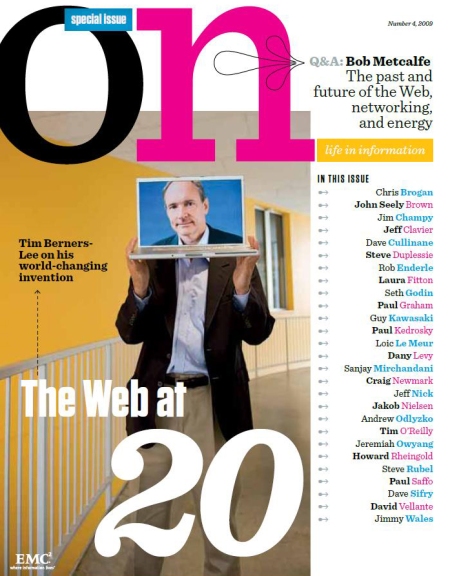EMC’s thought leadership publication, ON Magazine, has a great new issue celebrating 20 years of the Web. In the issue, there are full interviews with Bob Metcalfe (co-inventor of Ethernet), Tim Berners-Lee (inventor of the World Wide Web). There is also a great collection of shorter interviews with industry luminaries who were asked the following three questions:
- How has the Web changed your life?
- How has the Web changed business and society?
- What do you think the Web will look like in 20 years?
Here are two additional viewpoints to continue the conversation from the magazine.
See Me, Hear Me, Touch Me?
LOUIS GRAY | EARLY ADOPTER
→ Through his blog, Louis leads the way in exploring gadgets and technology on the web.
 The Web has become the universal source for information for practically any topic at any time, regardless of its source. It has also grown into the leading venue for communication with friends, colleagues, family and strangers. The Web has undone the traditional formats of scheduled information flow and has reduced many barriers that were geographically or class based. It has also allowed direct access to the authors of information in real time. As these barriers decrease, so to have some of the long held (now antiquated) barriers related to transparency and what information is valuable to be shared.
The Web has become the universal source for information for practically any topic at any time, regardless of its source. It has also grown into the leading venue for communication with friends, colleagues, family and strangers. The Web has undone the traditional formats of scheduled information flow and has reduced many barriers that were geographically or class based. It has also allowed direct access to the authors of information in real time. As these barriers decrease, so to have some of the long held (now antiquated) barriers related to transparency and what information is valuable to be shared.
In many ways, the Web has virtualized the physical. We have largely replaced physical communication with online messaging. We have reduced much of our commerce in exchange for online commerce. Travel to meetings and retailers has been largely reduced thanks to the Web and collaboration tools. Not only has society learned to turn to the Web for everything from news to business to entertainment, people have also become creators of content and entertainment themselves. They are producing videos for YouTube, writing insights on blogs, and staying connected to a broad network of connections by sharing photos on Facebook, Flickr or other sites. We have gone from a very traditional, private, society to one where people don’t blink about sharing their every meal, location, or spending habits. Some have chosen to livestream their daily activities, or broadcast their most embarrassing moments for thousands or even millions to see.
Any predictions on where the web will go in 20 years will be wrong. If you look backward 20 years, you will realize how little of an idea we actually have about what is to come. At this point, as communication gets faster and information is more accessible in more places in higher quality, it seems that the only real limits are physics and our own imagination. As the underlying components of the Web, including servers, software, networking and processing improve, so to will the potential for new ideas. Full-length movie downloads were just a concept only a few years ago, and now we don’t think twice about streaming them from Netflix or ordering them from iTunes to our Apple TV. What’s to say we can’t continue to see this maturation in the next two decades as our own activity becomes faster, lighter, mobile and connected? Will we have devices that carry, in our pocket, or in our headgear, the entirety of the world’s publications or videos ever published? Can we virtually meet with people from different locations and share the same experiences, including touch, taste and smell, without us being in the same geography?
Listen to the full 9 minute interview with Louis Gray here (click the play button below) or on Cinchcast.
Search and Find
HUTCH CARPENTER | VP of Product at Spigit
→ At his job and through his blog, Hutch explores the impact of technology on business and innovation.
The Web and Web 2.0 have allowed us to share our thoughts and to create a robust on-line resume through tools such as blogging and Twitter. Traditionally, people are reviewed based on their previous jobs; I was able to showcase my critical thinking skills through blogging, which allowed me to move from banking to high tech. Before I started at Spigit, I wrote a blog post about ideation and brainstorming which included a mention of Spigit. A customer linked from my site to the company site and requested a demo, this got me visibility with Spigit’s CEO.
The biggest impact of the Web on business has been search. Search has changed the way that people find information. Rather than using periodicals and trade references, you can get a broad selection of targeted results through the Web to meet your needs. Many interactions have gone digital, which helps businesses and individuals spread their message.
In the future, the Web will increase the connectivity between technology and people. I’ve written about Paul Saffo’s predictions [also see an interview with Paul Saffo in the ON Magazine] about how robots and sensors will change how we live in the future. Social web logic – the tracking of topics and people – will continue to increase the utility of search. There will be increasing visibility and importance to online reputation. I guarantee this though: Robert Scoble will be testing the outer limit of whatever it is.
Listen to the full 7 minute interview with Hutch Carpenter here (click the play button below) on Cinchcast.
What are your predictions for the future of the Web? Post your comments or record your thoughts using Cinchcast.
Please go to the complete issue of ON Magazine by clicking the cover below.
Stuart Miniman


[…] This post was mentioned on Twitter by globeizer, Evil Stu. Evil Stu said: Celebrating the Web at 20 http://bit.ly/6Vtjo5 […]
Great interviews, Stu, I’m heading over to read the ON Magazine issue now…